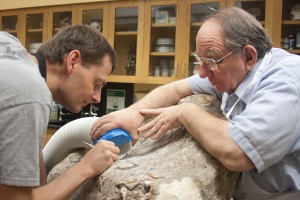The Museum of the Earth has a new addition to its collection — a revamped fossil lab that gives visitors the opportunity to work with science hands-on.

The renovated Fossil Prep Lab gives visitors a first-hand look at how fossils are unearthed from layers of rock and prepared for museum display. It is the only lab in the museum that is accessible to the public. Visitors are able to see the researchers’ work on a microscopic level from a television display outside of the lab. The windows of the lab open so that researchers can answer visitors’ questions and elaborate on the scientific process.
Cassie Mundt, marketing manager for the Museum of the Earth, said the museum’s Fossil Preparation Lab bridges the gap between research and education.
“The cool thing about the Museum of the Earth is that it’s specifically attached to a research institution that’s actively doing research and whose research is reflected in the museum,” she said. “And one of the things that’s most visible to the public now — that connection — is the Prep Lab.”
“The people we have working in the lab are great,” Mundt said. “They can speak to the Ph.D., or they can speak to the 3 year-old and have a great conversation.”
The Prep Lab is not specifically geared toward people interested in paleontology. The museum is always training volunteers to work on citizen science projects, which give the average person the opportunity to prepare and classify specimens.
On the opening day of the new Prep Lab, museum researchers as well as volunteers began to chip away at a sandstone rock containing fossils from the Jurassic period. The rock, weighing about 300 pounds, was found in an area of Utah known as Dinosaur National Monument.
Richard Kissel, director of teacher programs at the museum, said the fossils discovered from Dinosaur National Monument are typically well-known species.
“Dinosaurs like Stegosaurus — the big long-necked dinosaurs — those are the types of dinosaurs you get from that site,” Kissel said.
Carlyn Buckler, education associate at the Paleontological Research Institute and the Museum of the Earth, said volunteers can be anyone from English students to paleontologists.
“I have a suite of English majors that do the citizen science project, because when they’ve got to get away from Thoreau they can sit and do science,” Buckler said.
Volunteers learn how to use all the lab equipment — from tools resembling mini jackhammers to the impressive looking scanning electron microscope.
“I don’t think that in looking at [specimens] all put together in a big form in a museum you really appreciate the fact that someone sat there with a dental pick and a toothbrush [and] dug this thing out of stone,” Mundt said. “It really builds an appreciation and a better understanding of how these things were discovered.”
The Museum of the Earth is located at 1259 Trumansburg Road. Admission is $8 for adults and $3 for children.
For more information, visit www.museumoftheearth.org.







